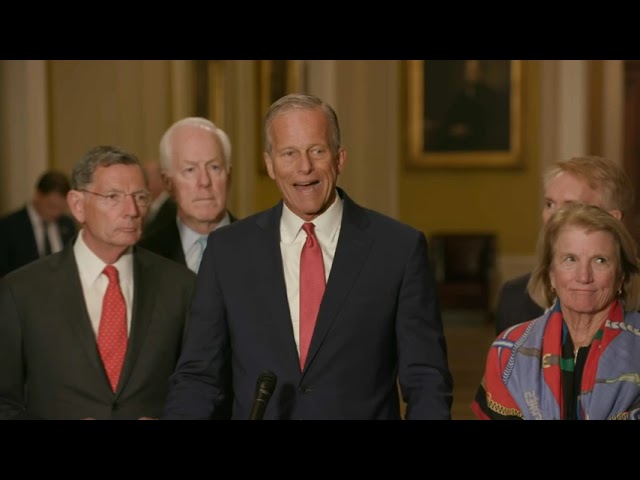Senate Majority Leader John Thune (R-S.D.) has moved to change the rules in the Senate to allow faster confirmation.
WASHINGTON—Senate Majority Leader John Thune (R-S.D.) on Sept. 8 announced that Republicans will take the “nuclear option” in the Senate to allow for faster confirmation of nominees by the president.
“Democrats have made President Donald Trump the first president on record to not have a single nominee confirmed via voice vote or unanimous consent, and they are forcing time-consuming votes on noncontroversial nominees who go on to be confirmed by large bipartisan margins,” Thune wrote in an op-ed published in Breitbart on Sept. 8.
To get around Democrats’ moves to block Trump’s nominees, Thune has moved to change the rules in the Senate.
On Sept. 9, lawmakers voted to move forward with a resolution introduced by Thune to allow for the consideration of 48 executive nominees en bloc—the first step toward expediting Trump’s nominees similarly in the future.
Here’s what to know.
What Is the ‘Nuclear Option’?
The “nuclear option” in the Senate describes a situation in which the majority party changes procedures in the Senate during the middle of a congressional session.
This is possible because such rules can be changed by a simple majority vote—meaning that a majority party at any time has the power to change or amend the rules as long as enough of its members are on board with the plan.
Since President Barack Obama’s time in office, both parties have made use of the nuclear option.
In 2013, then-Senate Majority Leader Harry Reid (D-Nev.) invoked the nuclear option to allow lower court judges to be confirmed by a simple majority vote. Later, then-Senate Majority Leader Mitch McConnell (R-Ky.) changed the rules to allow Supreme Court justices to be confirmed by a simple majority.
Such changes to the rules are considered precedent-setting, and the other party tends to take advantage of such precedents when it returns to power.
Why Are Republicans Considering It?
Historically, the nuclear option has been used to overcome perceived obstruction or other procedural hurdles placed by the opposition party, and this case is similar.
Since Trump returned to the White House, Senate Democrats have withheld unanimous consent and required voice votes on the president’s nominees, dragging out the process. Secretary of State Marco Rubio, a former senator, is one of the only civilian nominees who has not faced such delays in the Senate.
Although they’re out of power in Washington, Democrats have, in recent months, taken steps to slow the confirmation of Trump’s executive appointees.
This has included taking their full allotted time to speak for each individual nominee—a divergence from norms in Washington, where lawmakers have historically confirmed dozens or hundreds of lesser nominees through unanimous consent voice votes.
The situation has been ongoing since before lawmakers left for their monthlong August recess.
In his op-ed, Thune described this as “delay for delay’s sake.”
By Joseph Lord and Nathan Worcester








